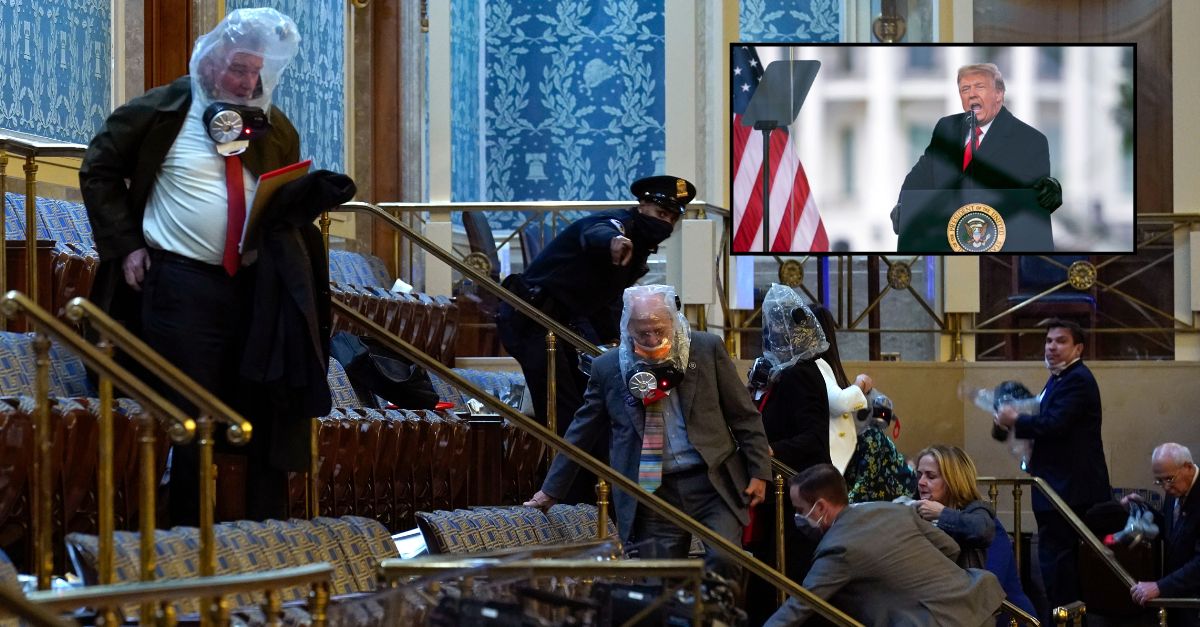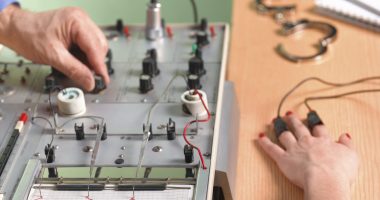
Background: People shelter in the House gallery as rioters try to break into the House Chamber at the U.S. Capitol on Wednesday, Jan. 6, 2021, in Washington. (AP Photo/Andrew Harnik)/ Inset: Then-president Donald Trump speaks during a rally protesting the electoral college certification of Joe Biden as President in Washington, Jan. 6, 2021. (AP Photo/Evan Vucci)
A group of current and former lawmakers and police suing Donald Trump for his alleged role fomenting the violence of Jan. 6 have agreed to give the former president — currently on trial in New York and preparing to make his last big push to advance his “absolute” immunity argument at the Supreme Court this week — a bit of grace. But on one condition.
As Law&Crime previously reported, the long-delayed civil litigation against Trump received a boost last week when U.S. District Judge Amit Mehta in Washington, D.C., rejected the former president’s attempts to halt discovery in the civil matter until his separate criminal prosecution brought by special counsel Jack Smith was complete.
There was no need for that, the judge found, and there was “no reason to wait on the Supreme Court” immunity decision either. The Barack Obama appointee did, however, tell Trump’s attorneys to file a proposed protective order that “at minimum” could ensure Trump’s response in the burgeoning civil discovery process remained under seal — at least, Mehta explained, until the court considered it further.
The judge also ordered both parties to submit a joint status report by the end of this week, giving him an idea of the discovery schedule specific to Trump’s immunity claim. Historically, Trump has defended his actions on Jan. 6 as part of his protected “official duties.” That notion was rejected by a federal appeals court already in Blassingame v. Trump, a case involving a similarly situated group of lawmakers and police plaintiffs. Trump missed his deadline to challenge the ruling at the Supreme Court this February.
No matter how Trump shapes this proposed order, it is unlikely to invoke any novel premise on immunity. He has advanced the claim in every venue where he has been indicted and it has been widely rejected. But oral arguments at the Supreme Court on Thursday will finally begin the process of settling the question and while there is no way to predict when the high court will rule, according to the new motion filed by the plaintiffs and Trump on Tuesday, giving Trump another two weeks to prepare his immunity position was agreeable.
Without opposition, the 3-page motion did clarify: If the judge grants this extension, then there must not be any further delays for the production of the materials granted.
The lawmaker and police plaintiffs agreed to give Trump until May 10 to submit his proposed protective order for discovery. Trump, should the judge grant the request, will have until May 15 to provide a “basis for his immunity defense.”
Have a tip we should know? [email protected]







